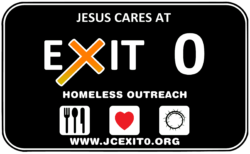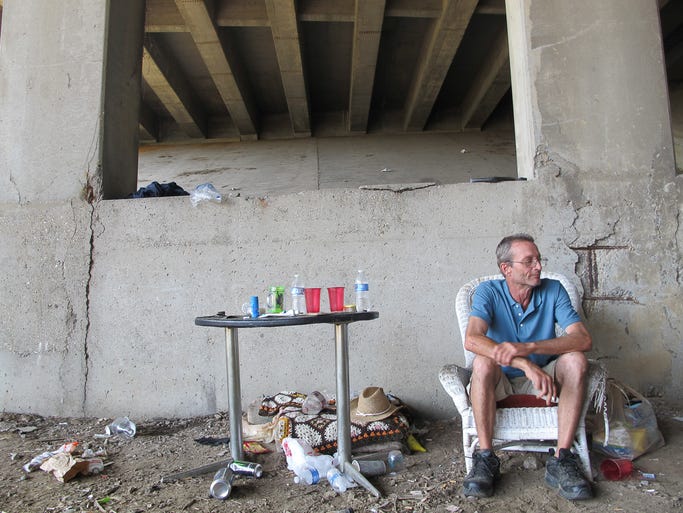Bridge construction forces homeless to relocate
Sitting on a dusty mattress, nursing a swollen elbow he got from a fall down the darkened concrete area above, Charles Sheckles prayed with Exit 0 homeless minister Paul Stensrud on Thursday morning under the 9th Street overpass in Jeffersonville.
“I just wonder where God is at right now. This is not me,” said a tearful Sheckles, 52, later revealing a half-pint of vodka he’d been drinking in lieu of prescribed medications for schizophrenia and bipolar disorder.
Sheckles and the half-dozen or so other men who live beneath the overpass must move before Walsh Construction begins demolition Sept. 1 as part of a new phase of Ohio River Bridges Project. Roughly a dozen people who were living under the 7th Street overpass were relocated when it closed last year.
Stensrud, who began his homeless ministry six years ago, says finding a new location could be hindered by Jeffersonville’s camping ban, approved by the city council shortly after the May 20 opening of the Big Four pedestrian and cycling ramp. It will depend on how police enforce the ban, he said.
“If they can’t stay under the bridges and they can’t pitch a tent, where else are they supposed to go?” Stensrud said, reiterating the need for a day shelter in Southern Indiana where the homeless could eat and shower.
Across the river in Louisville, there are three main day shelters in or near downtown that together serve about 450 people each day: Louisville Rescue Center (formerly Jefferson Street Baptist Center); Jefferson Street Baptist Community at Liberty; and St. John’s Center for Homeless Men, according to the Coalition for the Homeless. The coaltion includes nearly three dozen agencies that provide an array of services to thousands in need each year, aiming to transition them from homelessness to permanent housing with continuing community support.
Wayside Christian Missing also serves as a day shelter for women and families.
Maria Price, executive director at St. John’s, said 155 men — or 8 percent of the people who stayed there last year — reported their last address from a Southern Indiana zip codes. Price believes a day shelter on the Hoosier side would help, though she added the greater need on both sides is affordable housing.
A year ago, bridges project officials apologized to the Jeffersonville-Clarksville Homelessness Task Force after a subcontractor cleared a homeless encampment just east of Interstate 65 in Jeffersonville.
A policy adopted by the city last year requires the task force to be given 48 hours notice before items belonging to homeless people are removed.
Project officials have said homeless people living in a construction area is a matter of safety. “If we see someone in an obvious unsafe position, we have to do something,” said Max Rowland, a Walsh project manager.
Rowland said last week that Walsh has had few construction zone incidents involving homeless people in recent months, though workers did call Jeffersonville Police regarding an intoxicated man who refused to leave. Stensrud said he was called last week after another man took a worker’s lunch box.
New overpasses are designed with facades that cover supports, leaving fewer spaces for homeless people to live in.
But Barbara Anderson, executive director of Haven House, said the need isn’t more space under highways.
“The answer is not to move people from viaduct to viaduct, down the road,” Anderson said. “Because eventually you’re going to run out of road.”
Anderson estimates Southern Indiana needs 200 units of affordable housing, as well as more intensive case management for those who refuse to take medication or won’t comply with the terms of treatment programs, such as avoiding alcohol and drugs.
A comprehensive study of homelessness in Clark, Floyd and Harrison counties is expected to be completed by early next year, formally analyzing needs and recommending areas of improvement.
Stensrud said he helps homeless people sign up for public housing in Jeffersonville and New Albany.
But he and Anderson said the chronically homeless often have trouble getting into or maintaining homes due to lack of education, criminal records and trouble accepting personal responsibility. The homeless often need someone to walk them through the process and make sure they continue on a path to recovery.
Sheckles, who sometimes lives with his wife, would be allowed back at Haven House if he agreed to stay sober at the shelter, take his medications, pay $5 a day and attend group meetings.
Richmond Hurd, another homeless man who struggled with addiction and mental illness, said he has floated between the streets, friends’ couches and shelters on both sides of the river over the last dozen years. He said “it’s no big deal” to have to move from under the overpass, though he does feel a bit “overwhelmed” by all the changes over the last year.
“They’re trying to get us out of here and they will — but into darker corners,” he said.
Reporter Charlie White can be reached at (812 ) 949-4026 or on Twitter @c_write.

